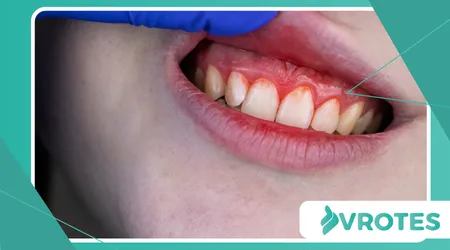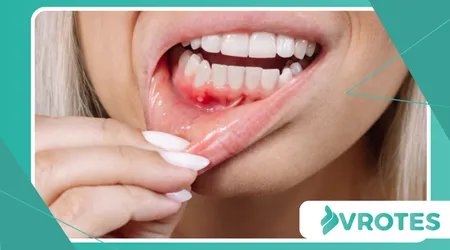The Surprising Link Between Menopause and Gum Health

The Surprising Link Between Menopause and Gum Health is a topic that deserves more attention and is a crucial part of holistic well-being during this life stage.
Anúncios
As women journey through menopause, the conversation often revolves around familiar symptoms.
Hot flashes, mood swings, and sleep disturbances dominate discussions. However, an often-overlooked area of concern is oral health.
Navigating this new phase of life involves a cascade of hormonal shifts.
Specifically, the decline in estrogen levels impacts the entire body, not just the reproductive system.
Anúncios
These hormonal changes can have a profound effect on the delicate tissues of the mouth, setting the stage for potential oral health issues.
The Estrogen-Oral Health Connection: A Deeper Dive
The relationship between estrogen and oral health is a fascinating one. Estrogen plays a vital role in maintaining bone density.
It also helps regulate inflammation throughout the body. When estrogen levels decrease, these protective effects diminish. This can make the mouth more susceptible to a range of problems.
The gums, in particular, are incredibly sensitive to these hormonal fluctuations. They can become more inflamed and tender.
This is why many women notice changes in their gums around this time. It’s a clear signal that something is happening beneath the surface.
Gums on the Frontline: Gingivitis and Periodontitis
Hormonal changes during menopause can create a perfect storm for gum disease. Gingivitis, the mildest form, is often the first sign.
Gums may appear red, swollen, and bleed easily during brushing. If left untreated, it can progress to periodontitis.
This is a more severe infection that can damage the jawbone and lead to tooth loss.
Read here: Menopause and Skin Barrier Function: How to Protect It
One original example of this is a woman in her late 40s who suddenly notices her gums are bleeding more frequently.
She hasn’t changed her brushing habits. She might assume it’s a new dental issue. In reality, it could be directly linked to the onset of perimenopause.
Understanding the Bone Loss Connection
The reduction of bone density, known as osteoporosis, is a well-documented consequence of menopause.
What many don’t realize is that this bone loss can also affect the jawbone.
A weaker jawbone provides less support for teeth. This can increase the risk of tooth mobility and, eventually, loss.
“Check this out: Make Your Badoo Profile Shine
The Surprising Link Between Menopause and Gum Health becomes even clearer here. The gums are like the soil for a tree.
If the soil (the jawbone) is eroding, the tree (the tooth) will become unstable. This analogy helps illustrate the critical connection between systemic bone health and oral structure.

Beyond Hormones: Other Contributing Factors
While hormonal shifts are central, other factors also play a role. Dry mouth, or xerostomia, is a common symptom of menopause.
Saliva is crucial for washing away food particles and neutralizing acids. A lack of saliva can increase the risk of cavities and gum disease.
Changes in diet and stress levels during menopause can also affect oral health. Many women experience increased sugar cravings.
++ The Gut-Brain Connection: How Fermented Foods Influence Your Mood
A higher sugar intake can contribute to plaque formation. Elevated stress can lead to teeth grinding (bruxism). This puts extra pressure on teeth and gums.
Another example: a woman experiencing dry mouth might start using sugar-laden lozenges to find relief.
This habit, while seemingly harmless, can significantly increase her risk of cavities. The combination of dry mouth and sugar creates an ideal environment for bacteria.
The Data Speaks: A Look at the Evidence
A relevant statistic from a 2018 study published in the journal Menopause found that postmenopausal women with osteoporosis were significantly more likely to have severe periodontitis compared to those without osteoporosis.
This is a clear indicator that bone density and gum health are intertwined.
The following table further highlights the oral health issues that can arise during menopause.
| Oral Health Condition | Potential Cause During Menopause |
| Gingivitis/Periodontitis | Reduced estrogen leads to increased gum inflammation. |
| Dry Mouth (Xerostomia) | Decreased saliva production due to hormonal changes. |
| Burning Mouth Syndrome | A feeling of tingling or burning, often linked to hormonal shifts. |
| Tooth Mobility | Bone loss in the jaw reduces support for teeth. |
These symptoms demonstrate the pervasive impact of menopause on the entire body.
The Surprising Link Between Menopause and Gum Health is not just a theory. It is a documented and clinically observed reality.
Strategies for Proactive Oral Care
Given this newfound understanding, what can women do? Proactive care is the best defense.
This includes regular dental check-ups and a consistent oral hygiene routine. Brushing twice a day and flossing daily are non-negotiable.

A Comprehensive Approach
Dental professionals can offer tailored advice. They might recommend special toothpaste or mouthwash for dry mouth.
They can also perform deep cleanings to address any signs of gum disease. Discussing hormone replacement therapy with a doctor is another option.
The Surprising Link Between Menopause and Gum Health highlights the need for a holistic perspective on women’s health.
You wouldn’t ignore a persistent headache, so why overlook bleeding gums? It’s a call to action.
A Final Thought on the Surprising Link Between Menopause and Gum Health
Menopause is a journey, not a destination. It’s a time of transformation and new challenges.
By understanding the Surprising Link Between Menopause and Gum Health, women can take charge of their well-being.
This knowledge empowers them to seek the right care and live their healthiest lives. Isn’t it time we started talking more openly about these lesser-known symptoms?
Frequently Asked Questions
Do all women in menopause get gum disease?
No, not all women will develop gum disease. However, the risk is significantly higher due to hormonal changes. Proactive dental care is essential to mitigate this risk.
Can I reverse gum disease caused by menopause?
A: Early-stage gum disease (gingivitis) is reversible with professional cleaning and good oral hygiene.
More advanced periodontitis can be managed but may require more intensive treatment to prevent further damage.
Should I tell my dentist I am going through menopause?
Absolutely. It’s crucial to inform your dentist about any health changes.
This helps them provide a more accurate diagnosis and a customized treatment plan. This includes any medications you may be taking.
